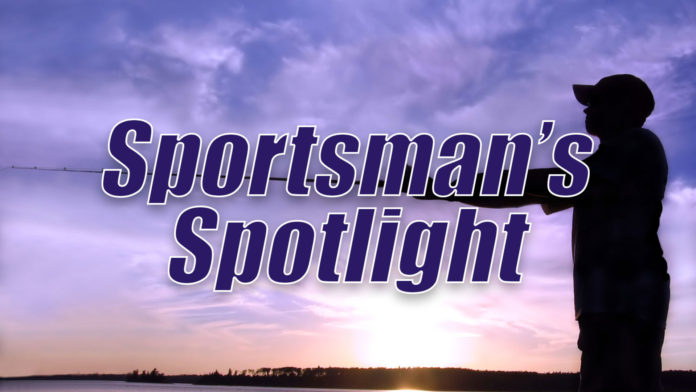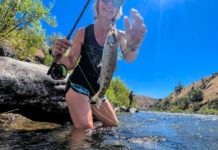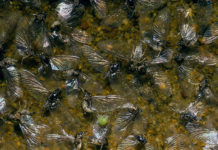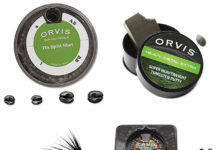Trout Fishing
Trout are the most popular game fish species and plentiful in the entire state and all types of waters from small streams and ponds to Idaho’s largest lakes and reservoirs. One of the best things about spring trout fishing is that anglers of all ages and experience levels can enjoy it, and Idaho Fish and Game will stock about 450,000 catchable trout throughout the state during May alone, and hundreds of thousands more throughout summer and fall.
Whether you want to catch freshly stocked rainbows out of a pond or catch a native trout out of a remote mountain stream, there are great opportunities.
Here are 10 tips for trout anglers new and experienced
1. CHOOSE THE RIGHT FISHING SPOT
If you want to find the best places to trout fish, it often boils down to what kind of fishing experience you want, whether a popular local fishing hole or a backcountry getaway. Check Fish and Game’s Fishing Planner, which is a database of all the state’s fishing spots and gives you information on where they’re located, what fish you might find there and a history of fish stocking.
2. IDENTIFY GOOD TROUT WATER
Good trout fishing spots are generally characterized by rocks, gravel bars, holes and a change in bottom contour. You should also be looking for eddies and current seams or shadow lines created by a bank when river fishing for trout. Trout can often be seen feeding on insects on the surface, so keep an eye for those tell-tale rings. Trout inhabit a lot of different kinds of habitat, but where you find them once, you will likely find them again unless water temps get too warm.
3. KNOW THE FISHING RULES
Most of Idaho offers year-round fishing, but there are exceptions. It’s fairly easy to know if there are special rules at a certain fishing spot. Look in the 2022-24 Idaho Fishing Seasons and Rules. Don’t be intimidated by the booklet — it’s pretty easy to figure out. It’s divided into the state’s seven regions, and at the beginning of each section is a list of waters that have special regulations. If the body of water you’re fishing, or plan to fish, is not on the list, all you have to know are the general rules for that region.
4. KNOW THE BEST TIME OF DAY TO FISH FOR TROUT
The best time of day to fish for trout is during the early morning hours. To be more specific, fish from dawn until about two hours after sunrise. The next best time is late afternoon, from about three hours prior to sunset until dusk. When determining the best times to fish for trout, realize that water temperature and cloud cover will also play a role.
5. GET THE RIGHT FISHING EQUIPMENT AND TACKLE FOR TROUT
When buying trout fishing equipment or tackle, for family fishing trips you’ll want to look for ultralight spinning tackle. The best rod and reel for trout in small streams and rivers is a 5 to 6-foot ultralight rod and reel combo. If you’re fishing for trout that are bigger than 20 inches, or plan to do any trolling, go with a medium power rod.
6. CHOOSE THE BEST LINE FOR TROUT
The best fishing line for trout is generally 4 to 8-pound test monofilament for still fishing or spinner fishing. The weight of the line depends on the species and size of the trout you are targeting (go on the heavier side for larger trout). It’s typically easier to cast small lures with lighter line. When trolling with a medium power rod, use 10 to 20-pound braid main line with a 6 to 10-pound monofilament or fluorocarbon leader.
7. PICK THE RIGHT BAIT FOR TROUT
If you’re fishing with kids, use live or natural baits for more bites. The best bait for trout during the spring is garden worms or nightcrawlers. Garden worms are smaller worms that are generally around two to five inches in length. They are the best and most often used trout bait, particularly in spring when they are found in rivers, creeks, lakes and ponds after a period of rainfall. Nightcrawlers are available nearly any place that sells fish bait.
8. KNOW THE BEST FISHING RIGS FOR TROUT
The best trout fishing rigs to use with bait would be either the fixed bobber rig (best for shallow ponds and small streams) or the slip bobber rig (when trout are feeding in the middle of the water column in deeper water), or weighted to the bottom. Anyone can learn the basic set up for trout fishing in a few minutes. See Fish and Game’s Learn to Fish webpage for instructions.
9. CHOOSE THE RIGHT LURE FOR TROUT
Small inline spinners are among the best trout fishing lures, particularly those that come in gold or colors that match the local baitfish in your area. Inline spinners in sizes #00, #0 & #1 are good trout fishing lures when used on an ultralight spinning combo for brook trout, rainbow trout or brown trout in rivers or streams.
10. DON’T FEAR FLY FISHING FOR TROUT
It’s a really fun way to fish for trout and very effective. When fly fishing for trout, a 9-foot flyrod rated for 5-weight line is the most versatile when fishing for trout in lakes, creeks and rivers. Fly patterns like the elkhair caddis, Adams, Griffith’s Gnat or Woolly Bugger are good patterns to start with for spring trout.
Spring trout fishing can be a whole lot of fun for everyone in the family once you have the right gear and knowledge to get started. Get outside and enjoy one of the best opportunities during your Memorial Day outings or summer trips. Wherever you are, odds are good there’s a place to go trout fishing nearby.
Credit: Source link































